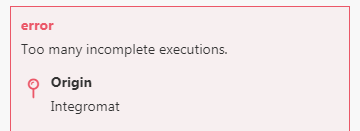Incomplete executions
Modified on Wed, 29 May, 2024 at 1:01 PM
Incomplete executions is a folder where scenario executions that could not be successfully finalized due to an error are stored. Each stored incomplete execution can be resolved either manually or automatically.
Note
By default the storing of incomplete executions is disabled. To enable it, enable the Allow storing incomplete executions option in the scenario advanced settings.
If a module encounters an error during its operation (see the Errors resulting in incomplete executions), a new incomplete execution is added to the Incomplete executions folder. Each incomplete execution contains the scenarios blueprint and all the bundles that can be mapped into the failed module. You can see the list of incomplete executions in the Incomplete executions tab.
Note
The size limit of the unresolved incomplete executions folder per organization depends on the number of operations in your pricing plan.
If the limit is exceeded, you will get the following error:
When a new incomplete execution is stored, you can resolve it as follows:
Go to the Incomplete executions tab.
Go to the exact incomplete execution.
If you want to see the log of all module's operations first:
Go to the History tab.
Locate the failed execution log and click Details.
Click the failing module that has an error.
Click Resolve. Make redirects you to the very incomplete execution.
If you want to directly go to the incomplete execution:
Go to the Incomplete executions tab.
Locate the failed execution and click Details.
Click the failing module. A scenario canvas opens.
Check the module settings and fix the reason for the error.
Click Save.
Click Run once.
The following options in Make scenario settings determine if and how the incomplete executions are stored:
Allow storing incomplete executions
Sequential processing
Enable data loss
There are several categories of errors that result into storing of incomplete executions. These may include: validation errors arising from incomplete or erroneous data, mostly because of a missing item that is expected in order to successfully process all data going through a module; or errors occurring from the final destination's unavailability because of temporary or long term connection failure (e.g. during connection to email or remote FTP server).
If an error occurs on the first module in the scenario, the execution stops immediately and no incomplete execution is stored.
If an error occurs on any other module and there is no error handler route attached, then:
If the error type is ConnectionError, RateLimitError, OutOfSpaceError or ModuleTimeoutError, an incomplete execution record WITH auto-retry is stored.
If the error type is DataError, InvalidConfigurationError, InvalidAccessTokenError, UnexpectedError, MaxFileSizeExceededError or MaxResultsExceededError, an incomplete execution record WITHOUT auto-retry is stored.
If the error type is anything other than the above, the execution fails.
Was this article helpful?
That’s Great!
Thank you for your feedback
Sorry! We couldn't be helpful
Thank you for your feedback
Feedback sent
We appreciate your effort and will try to fix the article





